216MANEL Report: Analysis of Thomas Cook's Economic Failure
VerifiedAdded on 2022/08/21
|11
|2129
|12
Report
AI Summary
This report provides an in-depth analysis of the economic factors that led to the failure of Thomas Cook, a prominent travel company. The report begins with an executive summary outlining the key findings, which highlight the interplay of micro and macroeconomic forces influencing the business. It examines the impact of both internal and external factors, including the company's strengths, weaknesses, opportunities, and threats, using SWOT analysis. Additionally, the report utilizes the PESTEL model to assess the political, economic, social, technological, environmental, and legal factors that affected Thomas Cook. The analysis emphasizes the role of Brexit, technological stagnation, and competition from low-cost carriers in the company's downfall. The report concludes with recommendations for preventing similar failures, such as adapting to technological advancements and avoiding unfavorable mergers. Overall, the report provides a comprehensive economic perspective on the collapse of Thomas Cook, offering valuable insights into business management and economic theory.
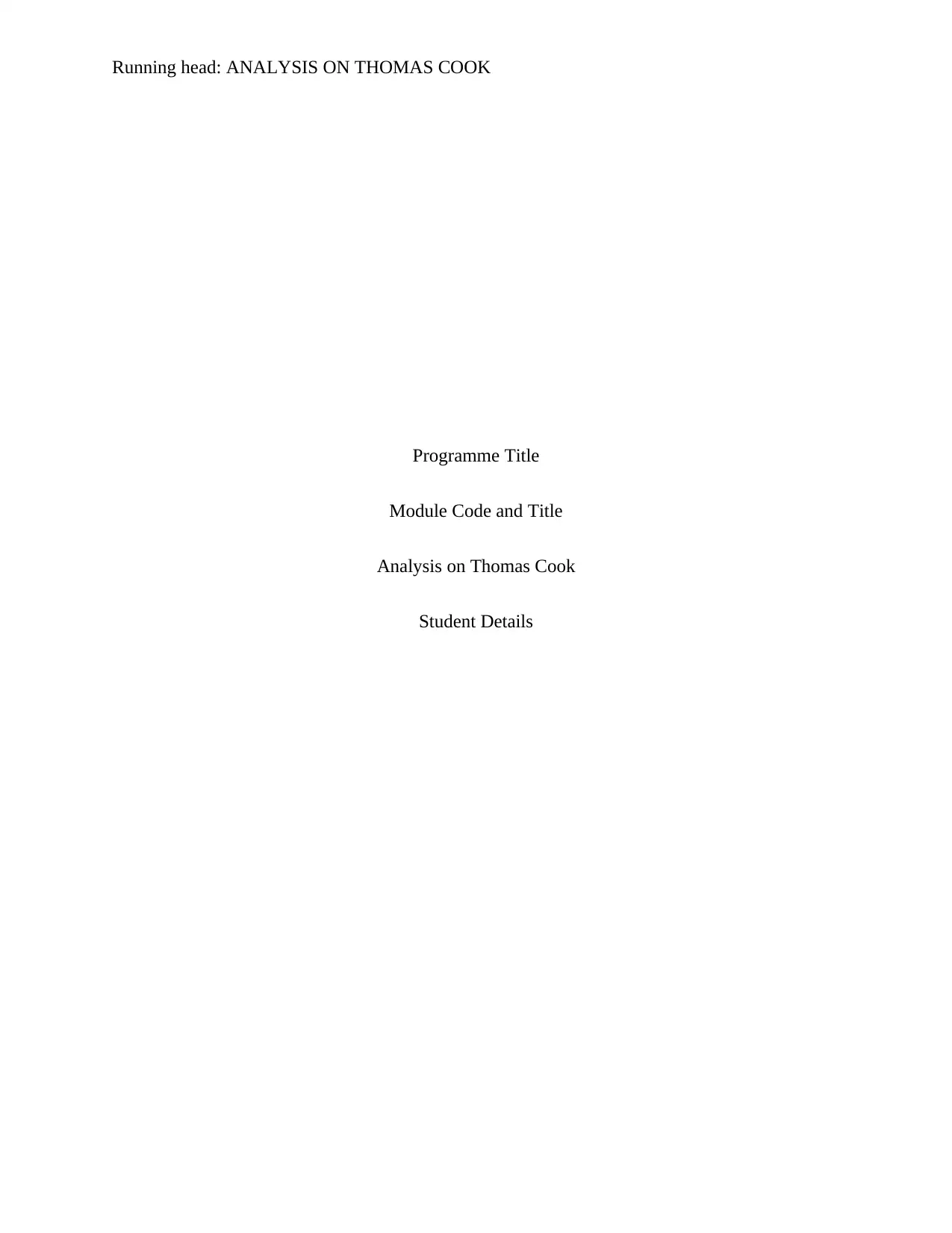
Running head: ANALYSIS ON THOMAS COOK
Programme Title
Module Code and Title
Analysis on Thomas Cook
Student Details
Programme Title
Module Code and Title
Analysis on Thomas Cook
Student Details
Paraphrase This Document
Need a fresh take? Get an instant paraphrase of this document with our AI Paraphraser
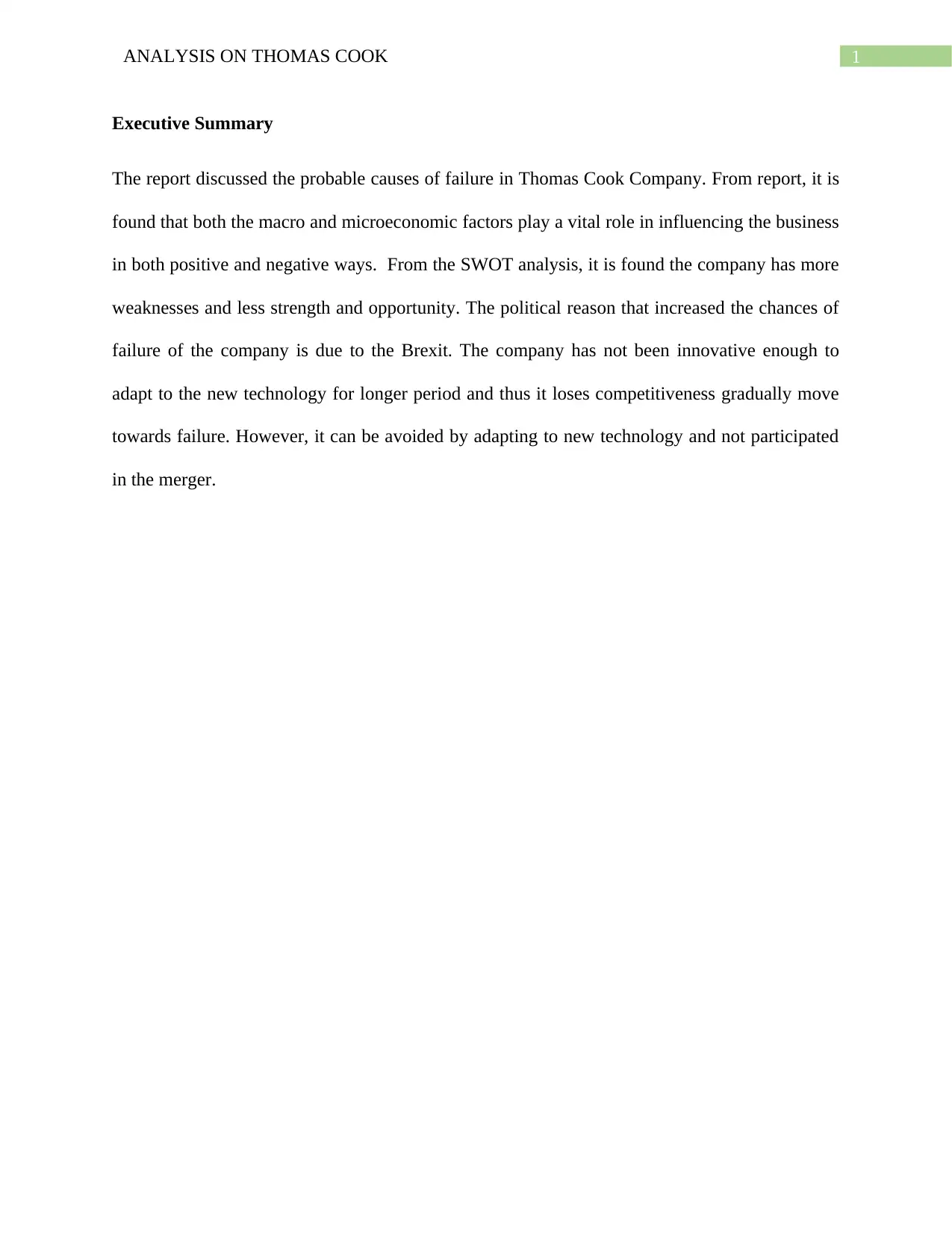
1ANALYSIS ON THOMAS COOK
Executive Summary
The report discussed the probable causes of failure in Thomas Cook Company. From report, it is
found that both the macro and microeconomic factors play a vital role in influencing the business
in both positive and negative ways. From the SWOT analysis, it is found the company has more
weaknesses and less strength and opportunity. The political reason that increased the chances of
failure of the company is due to the Brexit. The company has not been innovative enough to
adapt to the new technology for longer period and thus it loses competitiveness gradually move
towards failure. However, it can be avoided by adapting to new technology and not participated
in the merger.
Executive Summary
The report discussed the probable causes of failure in Thomas Cook Company. From report, it is
found that both the macro and microeconomic factors play a vital role in influencing the business
in both positive and negative ways. From the SWOT analysis, it is found the company has more
weaknesses and less strength and opportunity. The political reason that increased the chances of
failure of the company is due to the Brexit. The company has not been innovative enough to
adapt to the new technology for longer period and thus it loses competitiveness gradually move
towards failure. However, it can be avoided by adapting to new technology and not participated
in the merger.
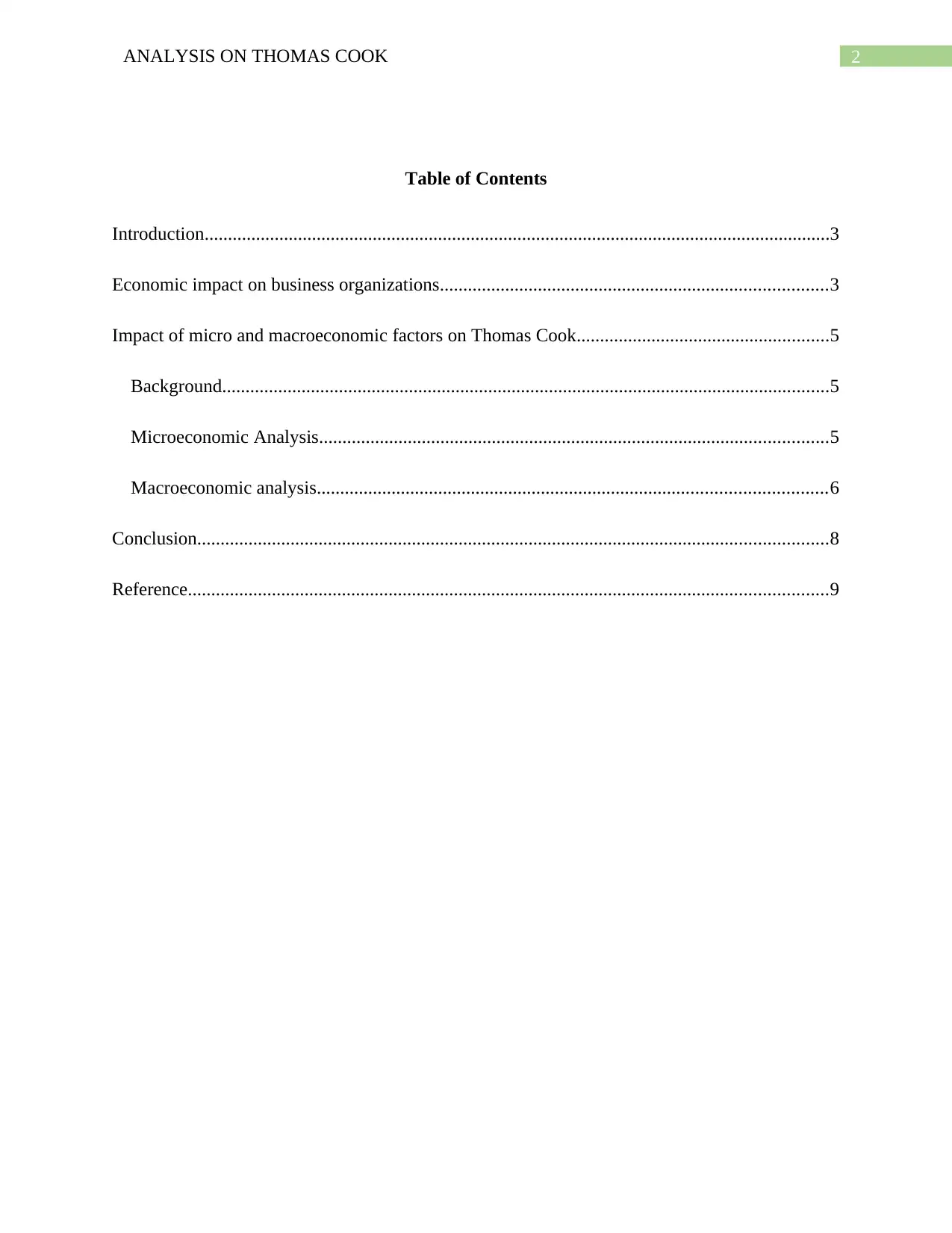
2ANALYSIS ON THOMAS COOK
Table of Contents
Introduction......................................................................................................................................3
Economic impact on business organizations...................................................................................3
Impact of micro and macroeconomic factors on Thomas Cook......................................................5
Background..................................................................................................................................5
Microeconomic Analysis.............................................................................................................5
Macroeconomic analysis.............................................................................................................6
Conclusion.......................................................................................................................................8
Reference.........................................................................................................................................9
Table of Contents
Introduction......................................................................................................................................3
Economic impact on business organizations...................................................................................3
Impact of micro and macroeconomic factors on Thomas Cook......................................................5
Background..................................................................................................................................5
Microeconomic Analysis.............................................................................................................5
Macroeconomic analysis.............................................................................................................6
Conclusion.......................................................................................................................................8
Reference.........................................................................................................................................9
⊘ This is a preview!⊘
Do you want full access?
Subscribe today to unlock all pages.

Trusted by 1+ million students worldwide
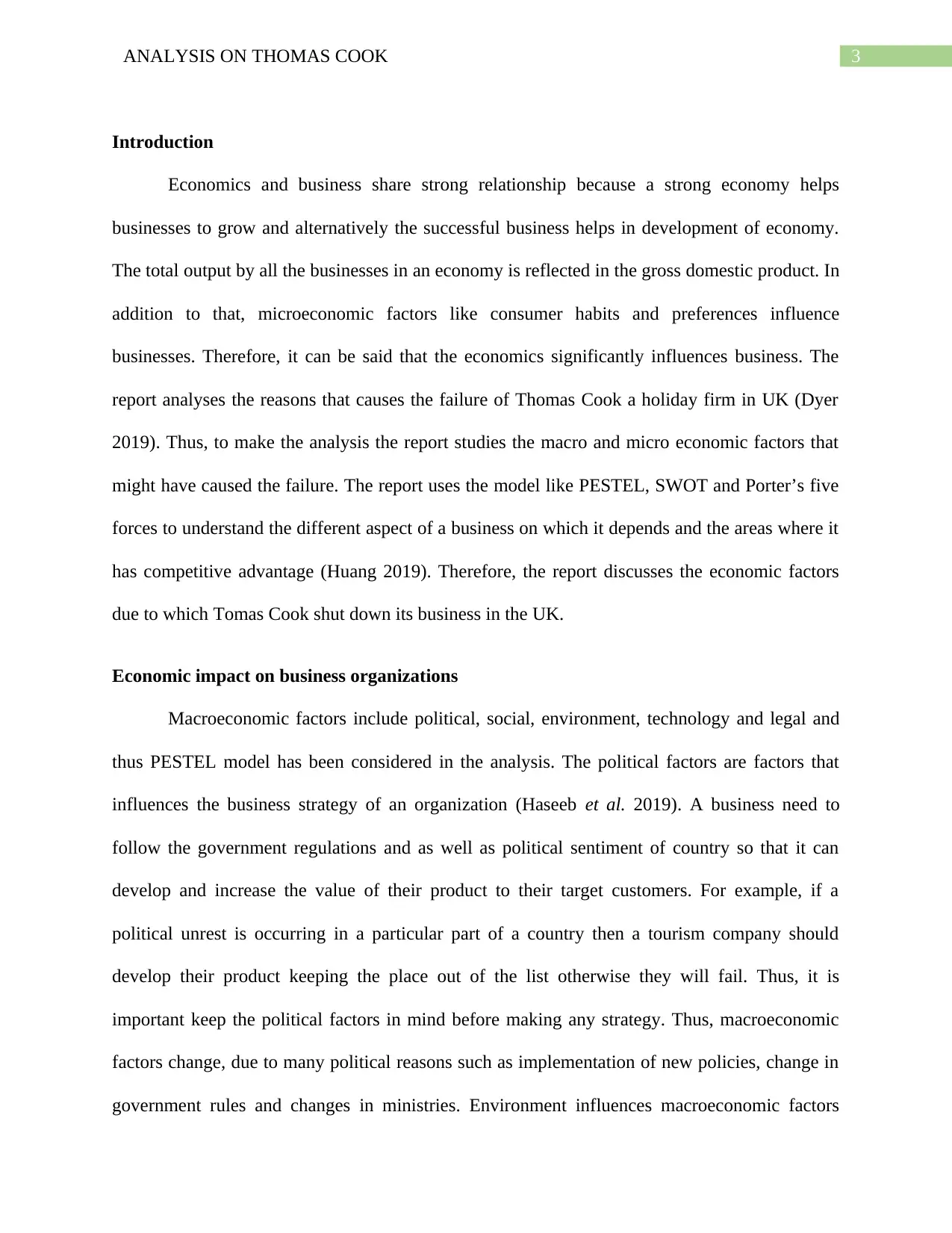
3ANALYSIS ON THOMAS COOK
Introduction
Economics and business share strong relationship because a strong economy helps
businesses to grow and alternatively the successful business helps in development of economy.
The total output by all the businesses in an economy is reflected in the gross domestic product. In
addition to that, microeconomic factors like consumer habits and preferences influence
businesses. Therefore, it can be said that the economics significantly influences business. The
report analyses the reasons that causes the failure of Thomas Cook a holiday firm in UK (Dyer
2019). Thus, to make the analysis the report studies the macro and micro economic factors that
might have caused the failure. The report uses the model like PESTEL, SWOT and Porter’s five
forces to understand the different aspect of a business on which it depends and the areas where it
has competitive advantage (Huang 2019). Therefore, the report discusses the economic factors
due to which Tomas Cook shut down its business in the UK.
Economic impact on business organizations
Macroeconomic factors include political, social, environment, technology and legal and
thus PESTEL model has been considered in the analysis. The political factors are factors that
influences the business strategy of an organization (Haseeb et al. 2019). A business need to
follow the government regulations and as well as political sentiment of country so that it can
develop and increase the value of their product to their target customers. For example, if a
political unrest is occurring in a particular part of a country then a tourism company should
develop their product keeping the place out of the list otherwise they will fail. Thus, it is
important keep the political factors in mind before making any strategy. Thus, macroeconomic
factors change, due to many political reasons such as implementation of new policies, change in
government rules and changes in ministries. Environment influences macroeconomic factors
Introduction
Economics and business share strong relationship because a strong economy helps
businesses to grow and alternatively the successful business helps in development of economy.
The total output by all the businesses in an economy is reflected in the gross domestic product. In
addition to that, microeconomic factors like consumer habits and preferences influence
businesses. Therefore, it can be said that the economics significantly influences business. The
report analyses the reasons that causes the failure of Thomas Cook a holiday firm in UK (Dyer
2019). Thus, to make the analysis the report studies the macro and micro economic factors that
might have caused the failure. The report uses the model like PESTEL, SWOT and Porter’s five
forces to understand the different aspect of a business on which it depends and the areas where it
has competitive advantage (Huang 2019). Therefore, the report discusses the economic factors
due to which Tomas Cook shut down its business in the UK.
Economic impact on business organizations
Macroeconomic factors include political, social, environment, technology and legal and
thus PESTEL model has been considered in the analysis. The political factors are factors that
influences the business strategy of an organization (Haseeb et al. 2019). A business need to
follow the government regulations and as well as political sentiment of country so that it can
develop and increase the value of their product to their target customers. For example, if a
political unrest is occurring in a particular part of a country then a tourism company should
develop their product keeping the place out of the list otherwise they will fail. Thus, it is
important keep the political factors in mind before making any strategy. Thus, macroeconomic
factors change, due to many political reasons such as implementation of new policies, change in
government rules and changes in ministries. Environment influences macroeconomic factors
Paraphrase This Document
Need a fresh take? Get an instant paraphrase of this document with our AI Paraphraser
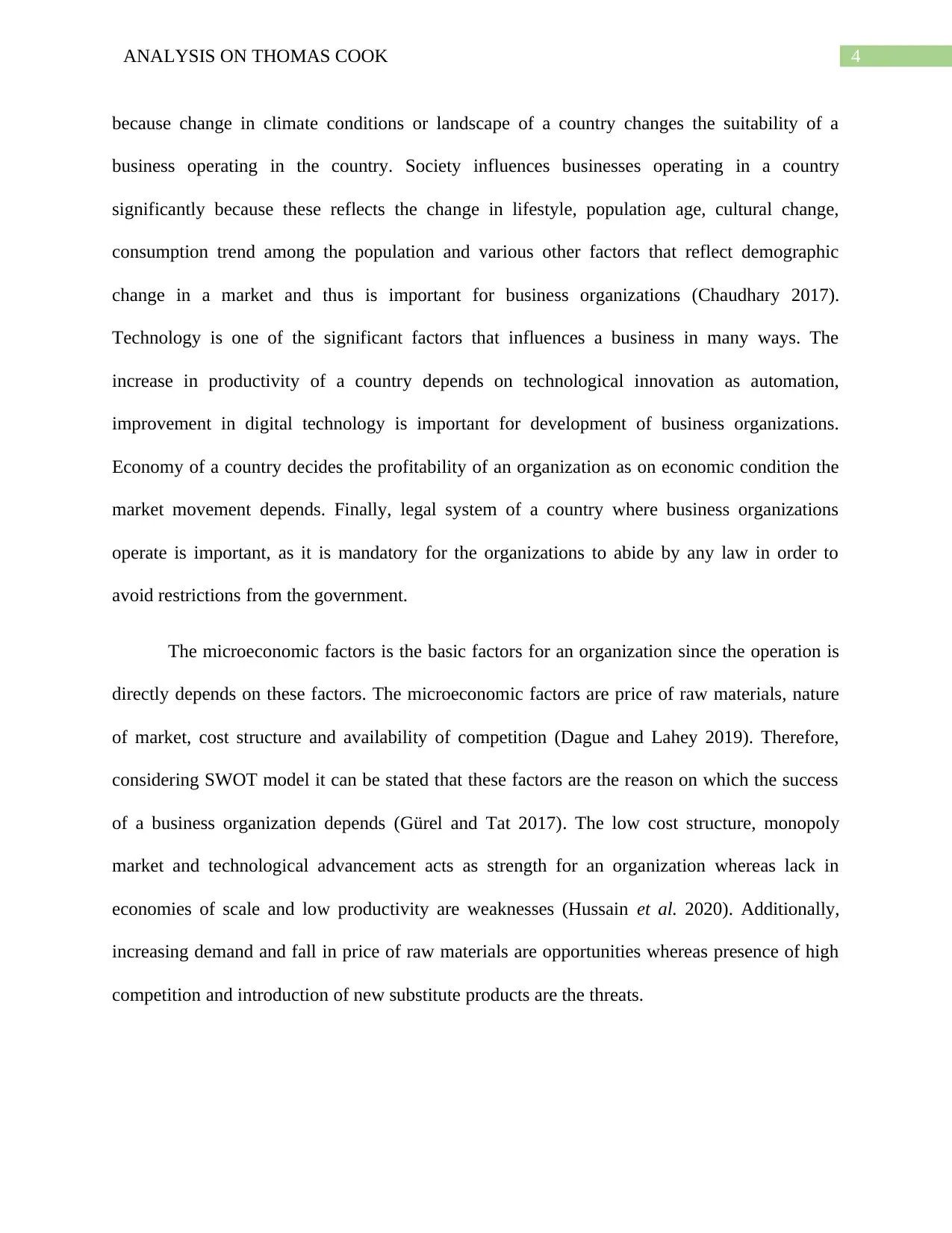
4ANALYSIS ON THOMAS COOK
because change in climate conditions or landscape of a country changes the suitability of a
business operating in the country. Society influences businesses operating in a country
significantly because these reflects the change in lifestyle, population age, cultural change,
consumption trend among the population and various other factors that reflect demographic
change in a market and thus is important for business organizations (Chaudhary 2017).
Technology is one of the significant factors that influences a business in many ways. The
increase in productivity of a country depends on technological innovation as automation,
improvement in digital technology is important for development of business organizations.
Economy of a country decides the profitability of an organization as on economic condition the
market movement depends. Finally, legal system of a country where business organizations
operate is important, as it is mandatory for the organizations to abide by any law in order to
avoid restrictions from the government.
The microeconomic factors is the basic factors for an organization since the operation is
directly depends on these factors. The microeconomic factors are price of raw materials, nature
of market, cost structure and availability of competition (Dague and Lahey 2019). Therefore,
considering SWOT model it can be stated that these factors are the reason on which the success
of a business organization depends (Gürel and Tat 2017). The low cost structure, monopoly
market and technological advancement acts as strength for an organization whereas lack in
economies of scale and low productivity are weaknesses (Hussain et al. 2020). Additionally,
increasing demand and fall in price of raw materials are opportunities whereas presence of high
competition and introduction of new substitute products are the threats.
because change in climate conditions or landscape of a country changes the suitability of a
business operating in the country. Society influences businesses operating in a country
significantly because these reflects the change in lifestyle, population age, cultural change,
consumption trend among the population and various other factors that reflect demographic
change in a market and thus is important for business organizations (Chaudhary 2017).
Technology is one of the significant factors that influences a business in many ways. The
increase in productivity of a country depends on technological innovation as automation,
improvement in digital technology is important for development of business organizations.
Economy of a country decides the profitability of an organization as on economic condition the
market movement depends. Finally, legal system of a country where business organizations
operate is important, as it is mandatory for the organizations to abide by any law in order to
avoid restrictions from the government.
The microeconomic factors is the basic factors for an organization since the operation is
directly depends on these factors. The microeconomic factors are price of raw materials, nature
of market, cost structure and availability of competition (Dague and Lahey 2019). Therefore,
considering SWOT model it can be stated that these factors are the reason on which the success
of a business organization depends (Gürel and Tat 2017). The low cost structure, monopoly
market and technological advancement acts as strength for an organization whereas lack in
economies of scale and low productivity are weaknesses (Hussain et al. 2020). Additionally,
increasing demand and fall in price of raw materials are opportunities whereas presence of high
competition and introduction of new substitute products are the threats.
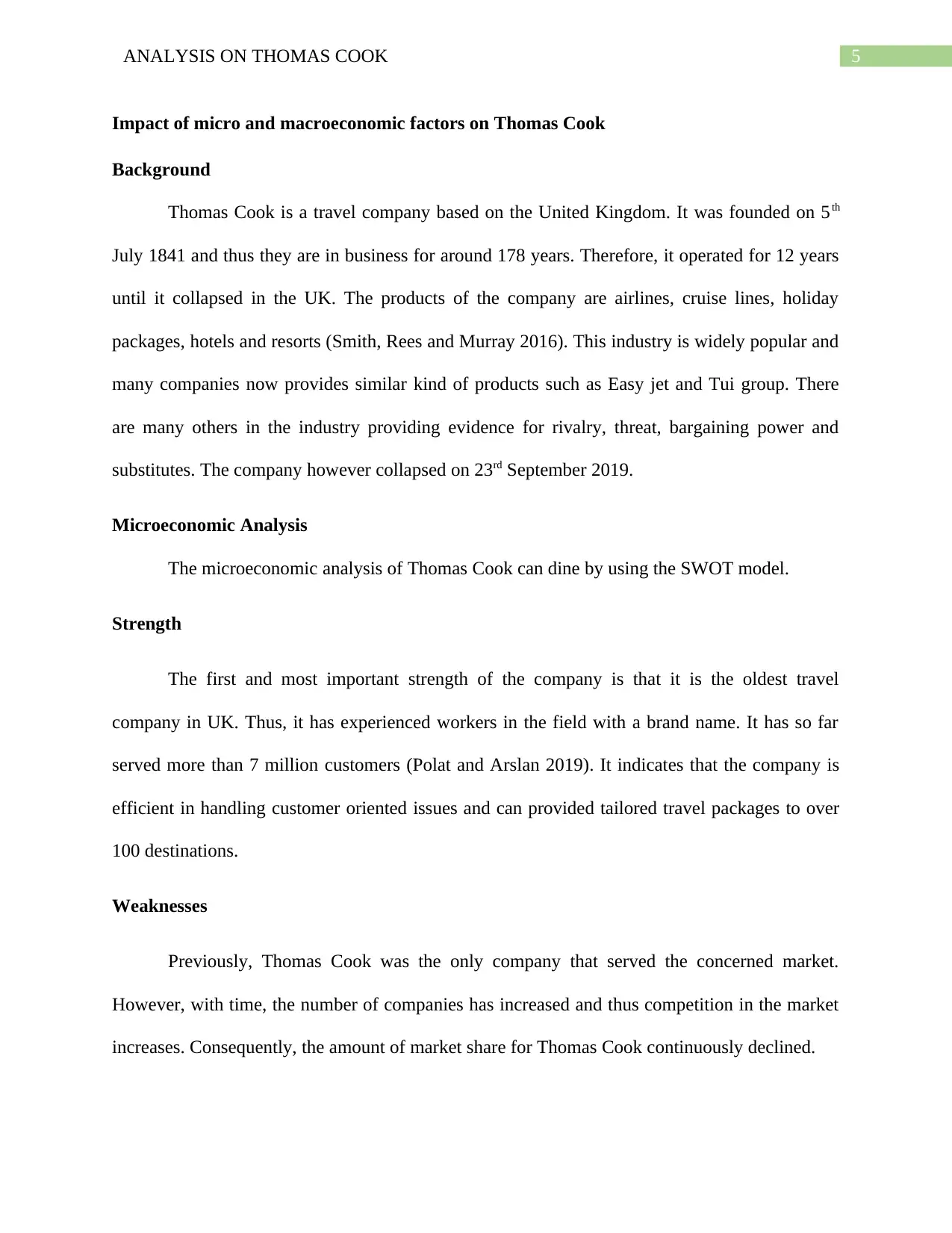
5ANALYSIS ON THOMAS COOK
Impact of micro and macroeconomic factors on Thomas Cook
Background
Thomas Cook is a travel company based on the United Kingdom. It was founded on 5th
July 1841 and thus they are in business for around 178 years. Therefore, it operated for 12 years
until it collapsed in the UK. The products of the company are airlines, cruise lines, holiday
packages, hotels and resorts (Smith, Rees and Murray 2016). This industry is widely popular and
many companies now provides similar kind of products such as Easy jet and Tui group. There
are many others in the industry providing evidence for rivalry, threat, bargaining power and
substitutes. The company however collapsed on 23rd September 2019.
Microeconomic Analysis
The microeconomic analysis of Thomas Cook can dine by using the SWOT model.
Strength
The first and most important strength of the company is that it is the oldest travel
company in UK. Thus, it has experienced workers in the field with a brand name. It has so far
served more than 7 million customers (Polat and Arslan 2019). It indicates that the company is
efficient in handling customer oriented issues and can provided tailored travel packages to over
100 destinations.
Weaknesses
Previously, Thomas Cook was the only company that served the concerned market.
However, with time, the number of companies has increased and thus competition in the market
increases. Consequently, the amount of market share for Thomas Cook continuously declined.
Impact of micro and macroeconomic factors on Thomas Cook
Background
Thomas Cook is a travel company based on the United Kingdom. It was founded on 5th
July 1841 and thus they are in business for around 178 years. Therefore, it operated for 12 years
until it collapsed in the UK. The products of the company are airlines, cruise lines, holiday
packages, hotels and resorts (Smith, Rees and Murray 2016). This industry is widely popular and
many companies now provides similar kind of products such as Easy jet and Tui group. There
are many others in the industry providing evidence for rivalry, threat, bargaining power and
substitutes. The company however collapsed on 23rd September 2019.
Microeconomic Analysis
The microeconomic analysis of Thomas Cook can dine by using the SWOT model.
Strength
The first and most important strength of the company is that it is the oldest travel
company in UK. Thus, it has experienced workers in the field with a brand name. It has so far
served more than 7 million customers (Polat and Arslan 2019). It indicates that the company is
efficient in handling customer oriented issues and can provided tailored travel packages to over
100 destinations.
Weaknesses
Previously, Thomas Cook was the only company that served the concerned market.
However, with time, the number of companies has increased and thus competition in the market
increases. Consequently, the amount of market share for Thomas Cook continuously declined.
⊘ This is a preview!⊘
Do you want full access?
Subscribe today to unlock all pages.

Trusted by 1+ million students worldwide
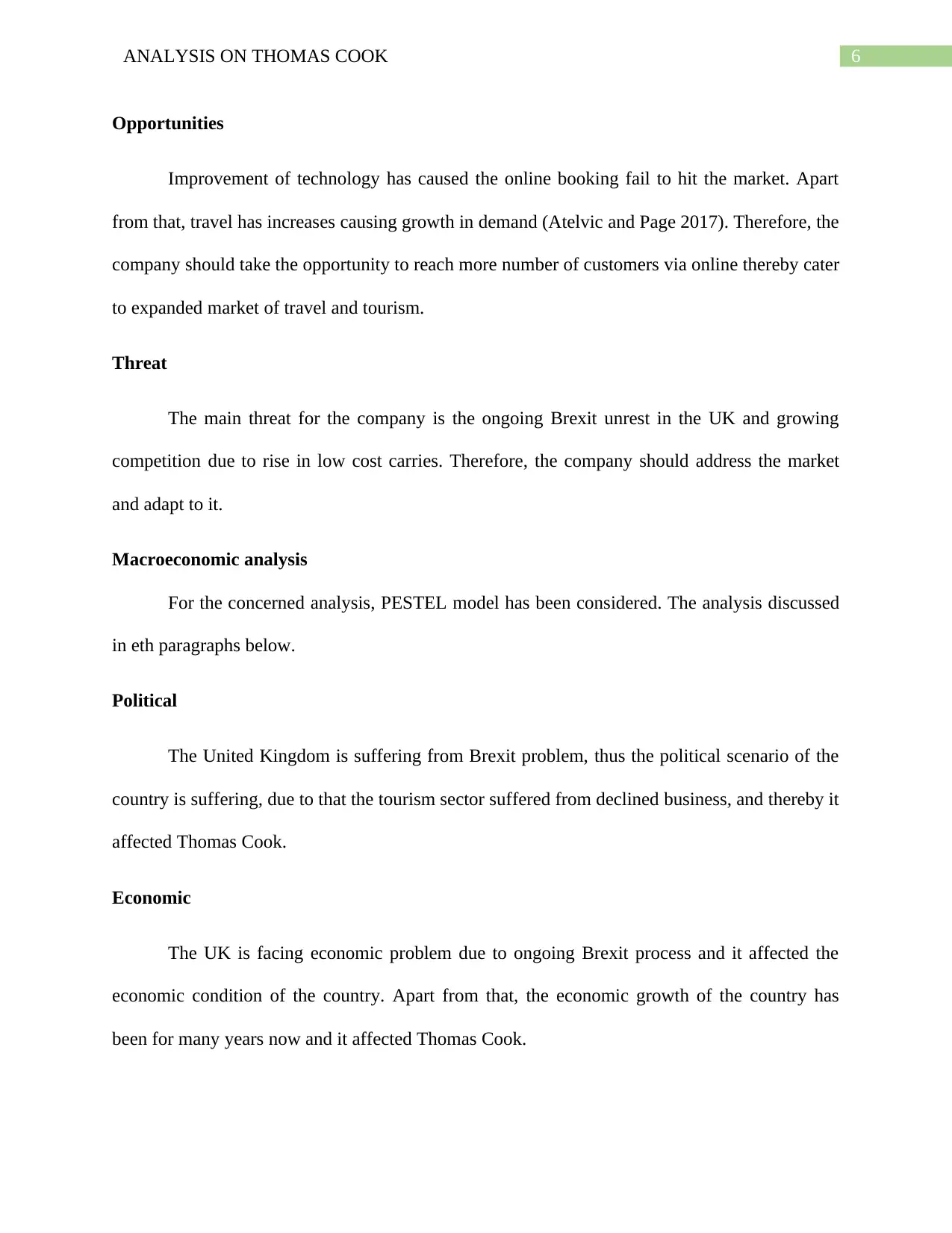
6ANALYSIS ON THOMAS COOK
Opportunities
Improvement of technology has caused the online booking fail to hit the market. Apart
from that, travel has increases causing growth in demand (Atelvic and Page 2017). Therefore, the
company should take the opportunity to reach more number of customers via online thereby cater
to expanded market of travel and tourism.
Threat
The main threat for the company is the ongoing Brexit unrest in the UK and growing
competition due to rise in low cost carries. Therefore, the company should address the market
and adapt to it.
Macroeconomic analysis
For the concerned analysis, PESTEL model has been considered. The analysis discussed
in eth paragraphs below.
Political
The United Kingdom is suffering from Brexit problem, thus the political scenario of the
country is suffering, due to that the tourism sector suffered from declined business, and thereby it
affected Thomas Cook.
Economic
The UK is facing economic problem due to ongoing Brexit process and it affected the
economic condition of the country. Apart from that, the economic growth of the country has
been for many years now and it affected Thomas Cook.
Opportunities
Improvement of technology has caused the online booking fail to hit the market. Apart
from that, travel has increases causing growth in demand (Atelvic and Page 2017). Therefore, the
company should take the opportunity to reach more number of customers via online thereby cater
to expanded market of travel and tourism.
Threat
The main threat for the company is the ongoing Brexit unrest in the UK and growing
competition due to rise in low cost carries. Therefore, the company should address the market
and adapt to it.
Macroeconomic analysis
For the concerned analysis, PESTEL model has been considered. The analysis discussed
in eth paragraphs below.
Political
The United Kingdom is suffering from Brexit problem, thus the political scenario of the
country is suffering, due to that the tourism sector suffered from declined business, and thereby it
affected Thomas Cook.
Economic
The UK is facing economic problem due to ongoing Brexit process and it affected the
economic condition of the country. Apart from that, the economic growth of the country has
been for many years now and it affected Thomas Cook.
Paraphrase This Document
Need a fresh take? Get an instant paraphrase of this document with our AI Paraphraser
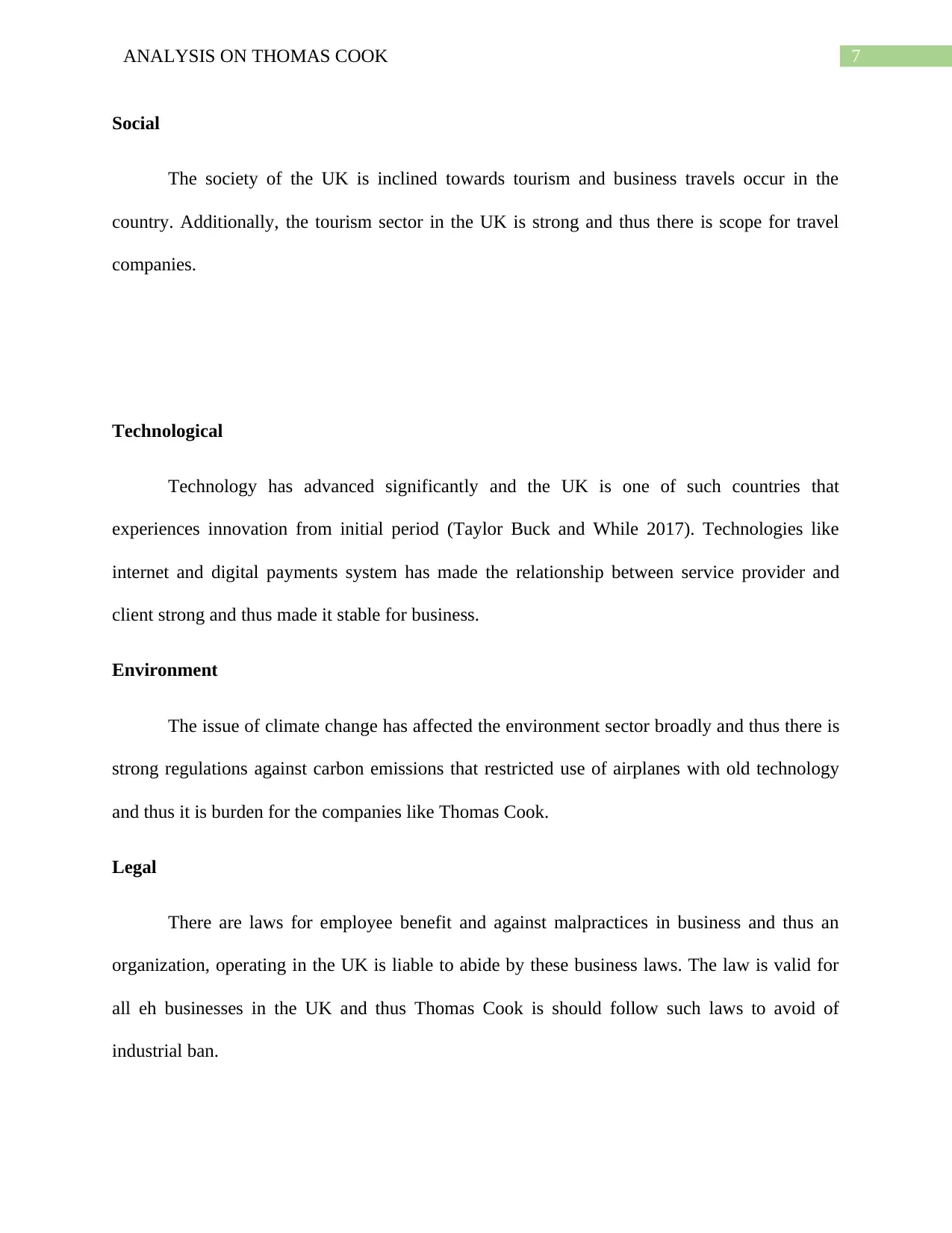
7ANALYSIS ON THOMAS COOK
Social
The society of the UK is inclined towards tourism and business travels occur in the
country. Additionally, the tourism sector in the UK is strong and thus there is scope for travel
companies.
Technological
Technology has advanced significantly and the UK is one of such countries that
experiences innovation from initial period (Taylor Buck and While 2017). Technologies like
internet and digital payments system has made the relationship between service provider and
client strong and thus made it stable for business.
Environment
The issue of climate change has affected the environment sector broadly and thus there is
strong regulations against carbon emissions that restricted use of airplanes with old technology
and thus it is burden for the companies like Thomas Cook.
Legal
There are laws for employee benefit and against malpractices in business and thus an
organization, operating in the UK is liable to abide by these business laws. The law is valid for
all eh businesses in the UK and thus Thomas Cook is should follow such laws to avoid of
industrial ban.
Social
The society of the UK is inclined towards tourism and business travels occur in the
country. Additionally, the tourism sector in the UK is strong and thus there is scope for travel
companies.
Technological
Technology has advanced significantly and the UK is one of such countries that
experiences innovation from initial period (Taylor Buck and While 2017). Technologies like
internet and digital payments system has made the relationship between service provider and
client strong and thus made it stable for business.
Environment
The issue of climate change has affected the environment sector broadly and thus there is
strong regulations against carbon emissions that restricted use of airplanes with old technology
and thus it is burden for the companies like Thomas Cook.
Legal
There are laws for employee benefit and against malpractices in business and thus an
organization, operating in the UK is liable to abide by these business laws. The law is valid for
all eh businesses in the UK and thus Thomas Cook is should follow such laws to avoid of
industrial ban.
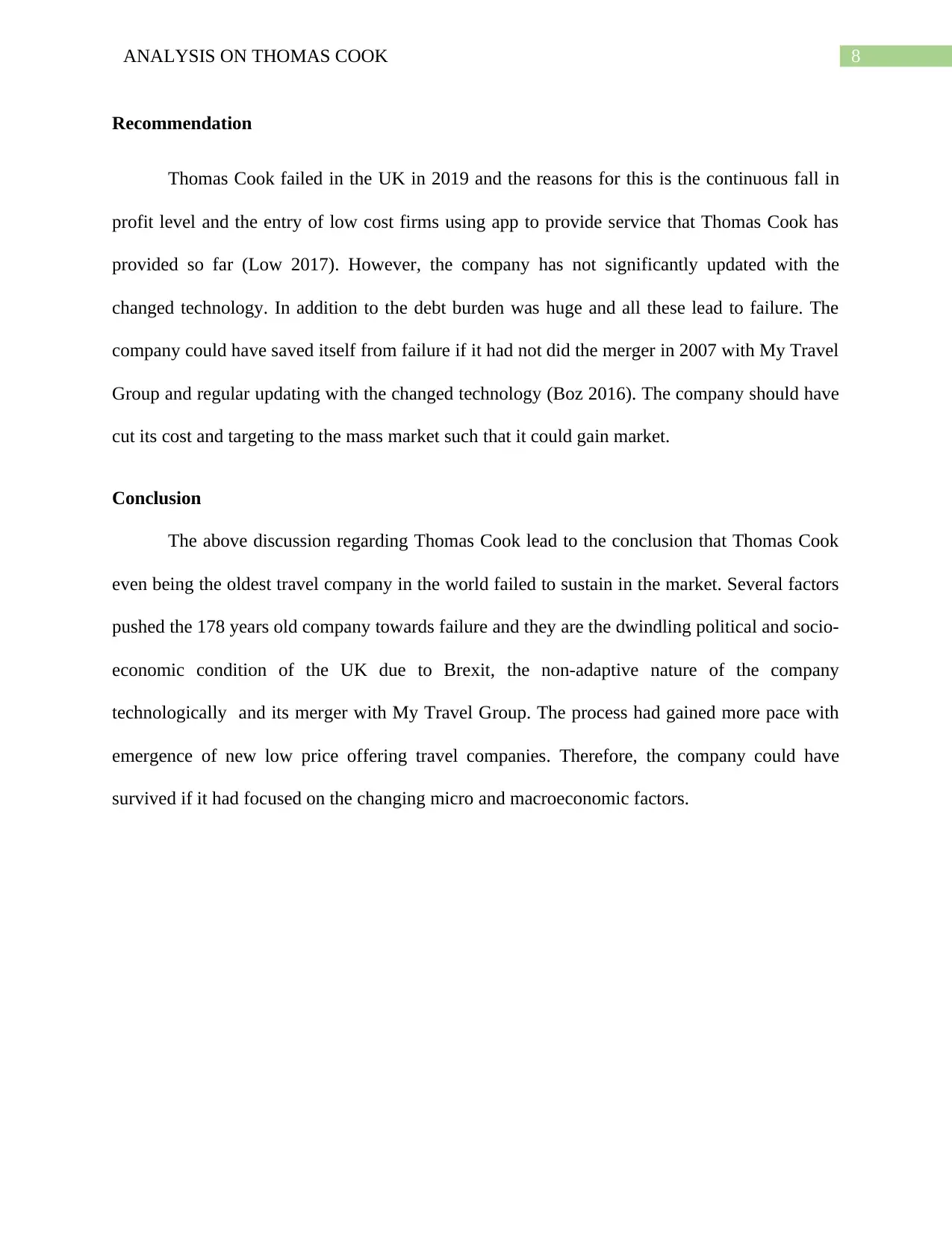
8ANALYSIS ON THOMAS COOK
Recommendation
Thomas Cook failed in the UK in 2019 and the reasons for this is the continuous fall in
profit level and the entry of low cost firms using app to provide service that Thomas Cook has
provided so far (Low 2017). However, the company has not significantly updated with the
changed technology. In addition to the debt burden was huge and all these lead to failure. The
company could have saved itself from failure if it had not did the merger in 2007 with My Travel
Group and regular updating with the changed technology (Boz 2016). The company should have
cut its cost and targeting to the mass market such that it could gain market.
Conclusion
The above discussion regarding Thomas Cook lead to the conclusion that Thomas Cook
even being the oldest travel company in the world failed to sustain in the market. Several factors
pushed the 178 years old company towards failure and they are the dwindling political and socio-
economic condition of the UK due to Brexit, the non-adaptive nature of the company
technologically and its merger with My Travel Group. The process had gained more pace with
emergence of new low price offering travel companies. Therefore, the company could have
survived if it had focused on the changing micro and macroeconomic factors.
Recommendation
Thomas Cook failed in the UK in 2019 and the reasons for this is the continuous fall in
profit level and the entry of low cost firms using app to provide service that Thomas Cook has
provided so far (Low 2017). However, the company has not significantly updated with the
changed technology. In addition to the debt burden was huge and all these lead to failure. The
company could have saved itself from failure if it had not did the merger in 2007 with My Travel
Group and regular updating with the changed technology (Boz 2016). The company should have
cut its cost and targeting to the mass market such that it could gain market.
Conclusion
The above discussion regarding Thomas Cook lead to the conclusion that Thomas Cook
even being the oldest travel company in the world failed to sustain in the market. Several factors
pushed the 178 years old company towards failure and they are the dwindling political and socio-
economic condition of the UK due to Brexit, the non-adaptive nature of the company
technologically and its merger with My Travel Group. The process had gained more pace with
emergence of new low price offering travel companies. Therefore, the company could have
survived if it had focused on the changing micro and macroeconomic factors.
⊘ This is a preview!⊘
Do you want full access?
Subscribe today to unlock all pages.

Trusted by 1+ million students worldwide
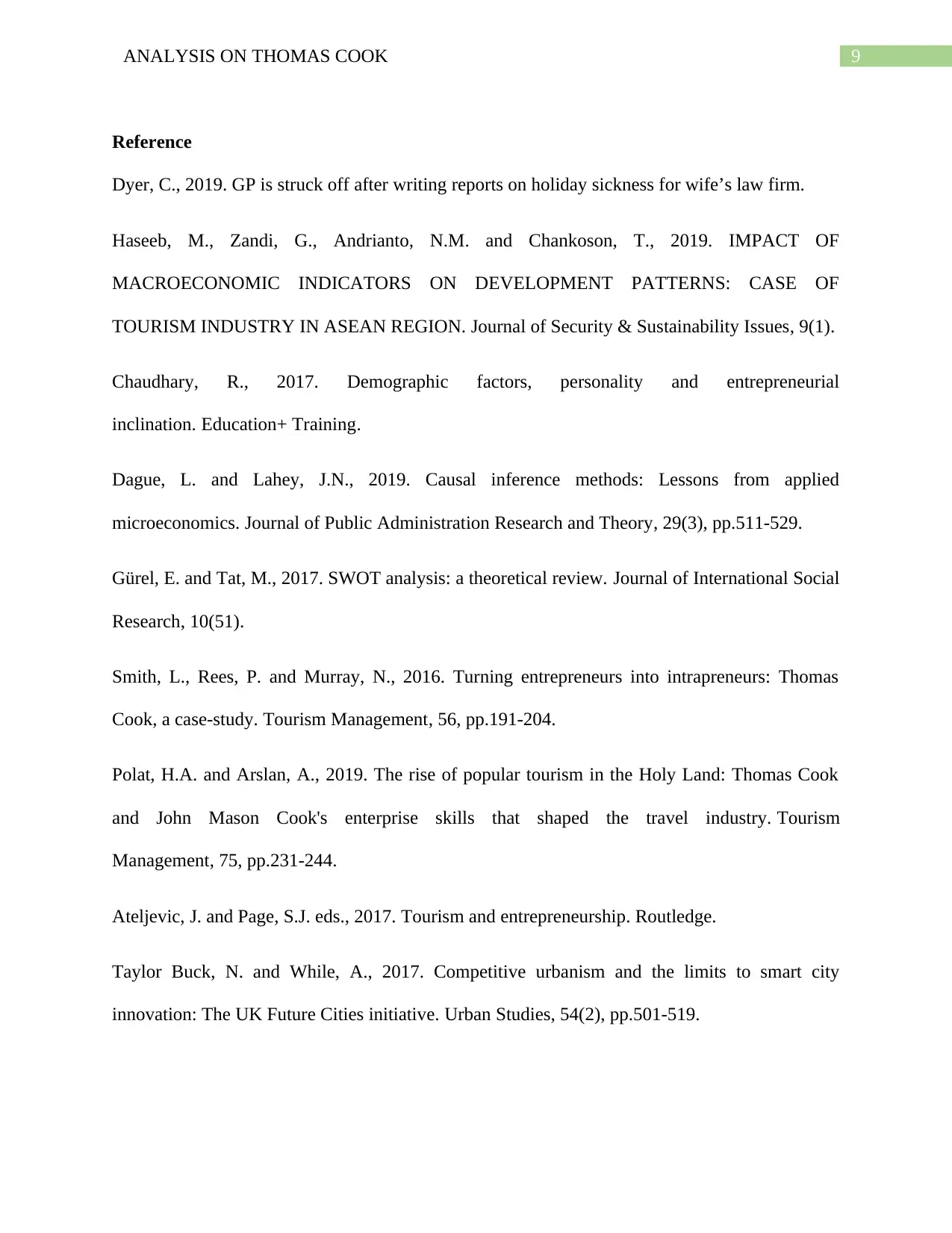
9ANALYSIS ON THOMAS COOK
Reference
Dyer, C., 2019. GP is struck off after writing reports on holiday sickness for wife’s law firm.
Haseeb, M., Zandi, G., Andrianto, N.M. and Chankoson, T., 2019. IMPACT OF
MACROECONOMIC INDICATORS ON DEVELOPMENT PATTERNS: CASE OF
TOURISM INDUSTRY IN ASEAN REGION. Journal of Security & Sustainability Issues, 9(1).
Chaudhary, R., 2017. Demographic factors, personality and entrepreneurial
inclination. Education+ Training.
Dague, L. and Lahey, J.N., 2019. Causal inference methods: Lessons from applied
microeconomics. Journal of Public Administration Research and Theory, 29(3), pp.511-529.
Gürel, E. and Tat, M., 2017. SWOT analysis: a theoretical review. Journal of International Social
Research, 10(51).
Smith, L., Rees, P. and Murray, N., 2016. Turning entrepreneurs into intrapreneurs: Thomas
Cook, a case-study. Tourism Management, 56, pp.191-204.
Polat, H.A. and Arslan, A., 2019. The rise of popular tourism in the Holy Land: Thomas Cook
and John Mason Cook's enterprise skills that shaped the travel industry. Tourism
Management, 75, pp.231-244.
Ateljevic, J. and Page, S.J. eds., 2017. Tourism and entrepreneurship. Routledge.
Taylor Buck, N. and While, A., 2017. Competitive urbanism and the limits to smart city
innovation: The UK Future Cities initiative. Urban Studies, 54(2), pp.501-519.
Reference
Dyer, C., 2019. GP is struck off after writing reports on holiday sickness for wife’s law firm.
Haseeb, M., Zandi, G., Andrianto, N.M. and Chankoson, T., 2019. IMPACT OF
MACROECONOMIC INDICATORS ON DEVELOPMENT PATTERNS: CASE OF
TOURISM INDUSTRY IN ASEAN REGION. Journal of Security & Sustainability Issues, 9(1).
Chaudhary, R., 2017. Demographic factors, personality and entrepreneurial
inclination. Education+ Training.
Dague, L. and Lahey, J.N., 2019. Causal inference methods: Lessons from applied
microeconomics. Journal of Public Administration Research and Theory, 29(3), pp.511-529.
Gürel, E. and Tat, M., 2017. SWOT analysis: a theoretical review. Journal of International Social
Research, 10(51).
Smith, L., Rees, P. and Murray, N., 2016. Turning entrepreneurs into intrapreneurs: Thomas
Cook, a case-study. Tourism Management, 56, pp.191-204.
Polat, H.A. and Arslan, A., 2019. The rise of popular tourism in the Holy Land: Thomas Cook
and John Mason Cook's enterprise skills that shaped the travel industry. Tourism
Management, 75, pp.231-244.
Ateljevic, J. and Page, S.J. eds., 2017. Tourism and entrepreneurship. Routledge.
Taylor Buck, N. and While, A., 2017. Competitive urbanism and the limits to smart city
innovation: The UK Future Cities initiative. Urban Studies, 54(2), pp.501-519.
Paraphrase This Document
Need a fresh take? Get an instant paraphrase of this document with our AI Paraphraser
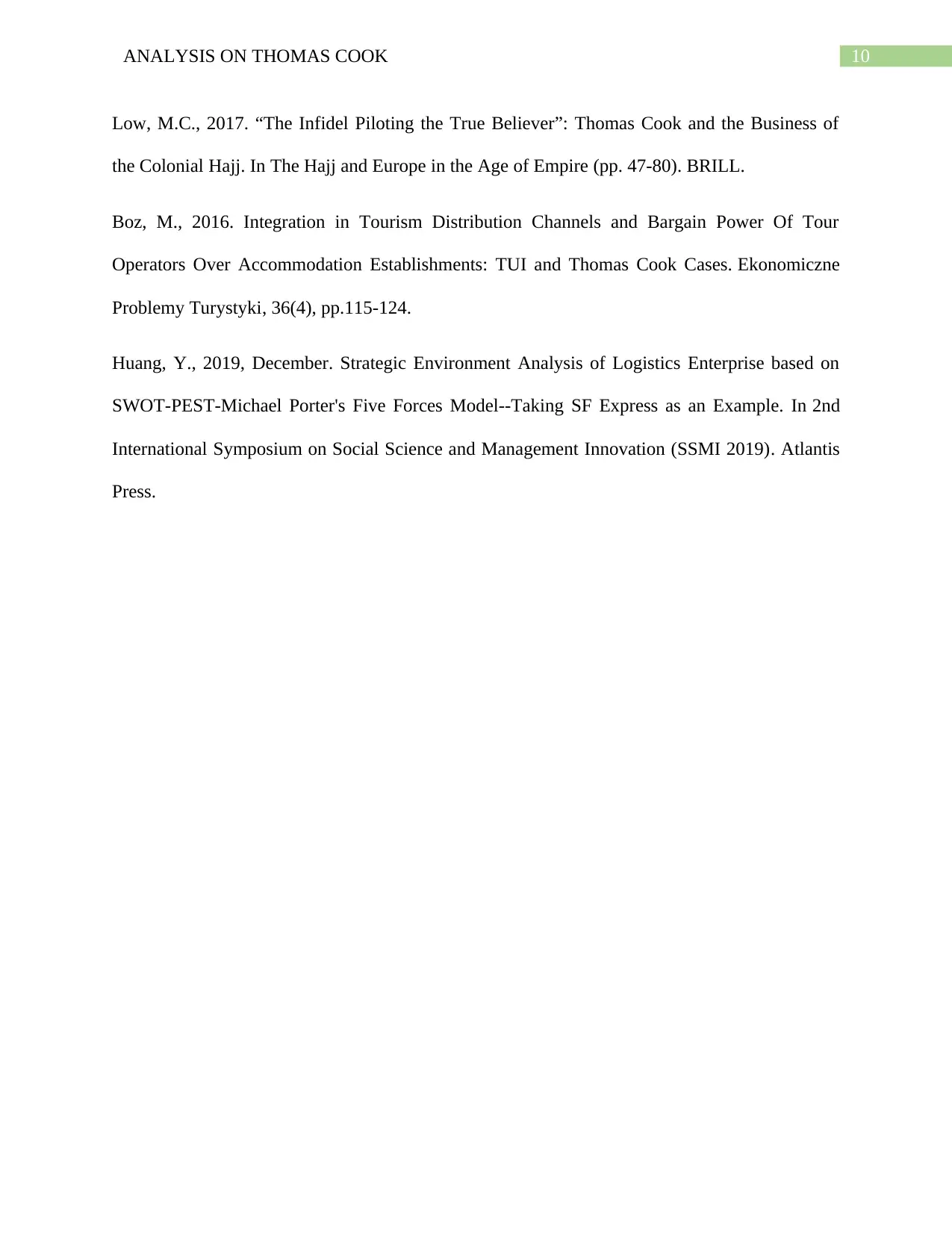
10ANALYSIS ON THOMAS COOK
Low, M.C., 2017. “The Infidel Piloting the True Believer”: Thomas Cook and the Business of
the Colonial Hajj. In The Hajj and Europe in the Age of Empire (pp. 47-80). BRILL.
Boz, M., 2016. Integration in Tourism Distribution Channels and Bargain Power Of Tour
Operators Over Accommodation Establishments: TUI and Thomas Cook Cases. Ekonomiczne
Problemy Turystyki, 36(4), pp.115-124.
Huang, Y., 2019, December. Strategic Environment Analysis of Logistics Enterprise based on
SWOT-PEST-Michael Porter's Five Forces Model--Taking SF Express as an Example. In 2nd
International Symposium on Social Science and Management Innovation (SSMI 2019). Atlantis
Press.
Low, M.C., 2017. “The Infidel Piloting the True Believer”: Thomas Cook and the Business of
the Colonial Hajj. In The Hajj and Europe in the Age of Empire (pp. 47-80). BRILL.
Boz, M., 2016. Integration in Tourism Distribution Channels and Bargain Power Of Tour
Operators Over Accommodation Establishments: TUI and Thomas Cook Cases. Ekonomiczne
Problemy Turystyki, 36(4), pp.115-124.
Huang, Y., 2019, December. Strategic Environment Analysis of Logistics Enterprise based on
SWOT-PEST-Michael Porter's Five Forces Model--Taking SF Express as an Example. In 2nd
International Symposium on Social Science and Management Innovation (SSMI 2019). Atlantis
Press.
1 out of 11
Related Documents
Your All-in-One AI-Powered Toolkit for Academic Success.
+13062052269
info@desklib.com
Available 24*7 on WhatsApp / Email
![[object Object]](/_next/static/media/star-bottom.7253800d.svg)
Unlock your academic potential
Copyright © 2020–2026 A2Z Services. All Rights Reserved. Developed and managed by ZUCOL.





